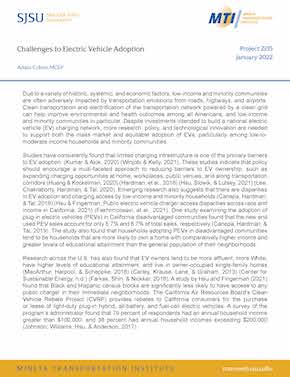- 408-924-7560
- mineta-institute@sjsu.edu
- Donate
Challenges to Electric Vehicle Adoption
Due to a variety of historic, systemic, and economic factors, low-income and minority communities are often adversely impacted by transportation emissions from roads, highways, and airports. Clean transportation and electrification of the transportation network powered by a clean grid can help improve environmental and health outcomes among all Americans, and low-income and minority communities in particular. Despite investments intended to build a national electric vehicle (EV) charging network, more research, policy, and technological innovation are needed to support both the mass market and equitable adoption of EVs, particularly among low-to-moderate income households and minority communities. Four common challenges to expanding electric vehicle adoption among vulnerable populations include cost, home-based charging, vehicle range and affordable housing, rural charging.
ADAM COHEN
Adam Cohen is an MTI Research Associate and a researcher at the Transportation Sustainability Research Center at the University of California, Berkeley. Since joining the group in 2004, his research has focused on innovative urban mobility solutions, including shared mobility, smart cities technologies, smartphone apps, automated and connected vehicles, urban air mobility, and other innovative and emerging transportation technologies. He has also co-authored numerous articles and reports on shared mobility in peer-reviewed journals and conference proceedings. Previously, Cohen worked for the Information Technology and Telecommunications Laboratory (ITTL) at the Georgia Tech Research Institute (GTRI). His academic background is in city and regional planning and international affairs.
-
Contact Us
San José State University One Washington Square, San Jose, CA 95192 Phone: 408-924-7560 Email: mineta-institute@sjsu.edu






